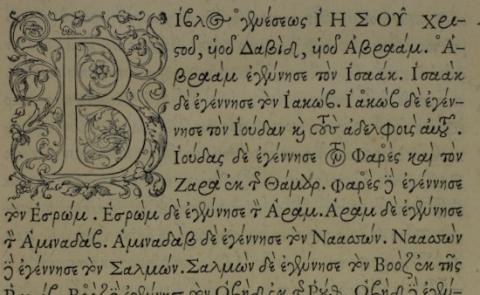—by Adam Boyd
When translating the New Testament, the key question we are always asking ourselves is, HOW do we translate the Greek text into the target language. But there is a secondary question that we must also take into consideration at times, namely, WHICH Greek text do we translate. This secondary question is addressed by the field of Textual Criticism.
The books of the Greek New Testament were all composed within the first century AD. But as copies were made, changes were introduced in a few different ways. First, scribes made errors when they copied the text. For example, Papyrus 66, which was copied around AD 200, is full of basic errors because the scribe who made the copy did not speak Greek and was copying letter-by-letter (rather than word-by-word). Given that early manuscripts had no spaces between words, it would be very easy to skip over text inadvertently, which is exactly what the scribe did. (Fortunately most scribes did speak Greek and did not make errors like this.) Other changes were introduced by heretics, who were seeking to bolster their false doctrines. And still other changes were made in an attempt to “correct” the grammar and style of the text. But whether the changes were accidental or intentional, the vast majority of them were introduced before the year AD 200.
As the Greek New Testament spread throughout the Roman empire, three different types of texts emerged in three different areas: the Western text in the western part of the Roman empire, the Alexandrian text in Egypt, and the Byzantine text in the eastern part of the Roman empire. The Western text often shows signs of paraphrasing the original Greek and exists today more in Latin translation than it does in Greek manuscripts (although there are a few Greek manuscripts of the Western text). The Alexandrian text is often short and terse, having readings that are harder to understand, and it is represented by only a small minority of Greek manuscripts. The Byzantine text is represented in the overwhelming majority of Greek manuscripts, and it is longer than the Alexandrian text with smoother Greek.
While it appears that none of these text types preserve much in the way of the false teachings introduced by heretics, it is clear that minor scribal errors and intentional changes to grammar and style are preserved in at least some of the text types. The vast majority of these changes are extremely minor and cannot even be translated into English. And of the changes that can be translated into English, the vast majority are again extremely minor and do not affect the meaning of the text at all. Only a small minority of the differences between the three different text types affect the meaning of the text, but even then, none of the teachings of Jesus and Apostles are obscured by these differences, and so we can have great confidence in Scripture as it has been preserved. Nevertheless, as translators we must choose which text to translate.
One of the most notable examples is the ending to the Lord’s prayer in Matthew 6:13. The Byzantine text, which is supported by 98.7% of the Greek manuscripts, reads, “For thine is the kingdom and the power and the glory forever. Amen.” But the Alexandrian text and the Western text lack this ending to the prayer. So that leaves us with a question: Did Matthew include this ending to the prayer in his gospel or not? That is the question we as Bible translators must ask ourselves. Unfortunately, the answer to that question is too complicated to address in this short email, and even the best of scholars do not agree on the right answer. Translations like the King James Version and New King James Version include the longer ending, while translations like the English Standard Version and New International Version omit it.
Textual Criticism is just one more factor that Bible translators must wrestle with as we seek to translate Scripture into the minority languages of the world. Thankfully, textual differences are so minor that they do not affect the trustworthiness of Scripture. Therefore our confidence in the inspiration of Scripture is not shaken.
Adam Boyd is a Wycliffe Bible translator who works with the Enga people of Papua New Guinea.
Hear the author discuss God's preservation of Scripture in our new film "God's Word: Enduring Through the Ages." Click here to view the session on Youtube. Click here to view the film on our site (scroll down to Session 2).
For those interested in further reading on the subject of textual criticism, we recommend the article, "A Deeper Look at the Traditional Byzantine Text," by Glenn Kerr. Click here to access.

